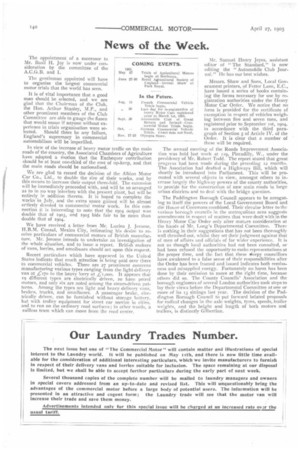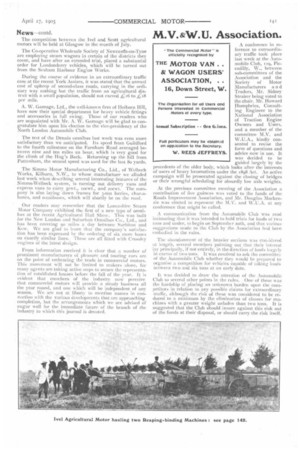News of the Week.
Page 4

Page 5

If you've noticed an error in this article please click here to report it so we can fix it.
The appointment of a successor to Mr. Basil H. Joy is now under consideration by the committee of the A.C.G.B. and I.
The gentleman appointed will have to organise the largest commercial motor trials that the world has seen.
It is of vital importance that a good man should be selected, and we are glad that the Chairman of the Club, the Hon. Arthur Stanley, M.P., and other prominent members of the Club Committee are able to gauge the fiasco that would ensue if anyone without experience in trials organisation were se lected. Should there be any failure, England's supremacy in commercial automobilism will be imperilled.
In view of the increase of heavy motor traffic on the main roads of the country, the Associated Chambers of Agriculture have adopted a motion that the Exchequer contribution • should be at least one-third of the cost of up-keep, and that the main roads should be nationalised.
We are glad to record the decision of the Albion Motor Car Co., Lid., to double the size of their works, and by this means to increase their output three-fold. The extension will be immediately proceeded with, and will be so arranged as to in no way interfere with the present plant, but will be entirely in addition thereto. It is hoped to complete the works in July, and the extra space gained will be almost ectirely devoted to commercial motor work. In this connection it is interesting to note that the 1904 output was double that of 1903, and tqos bids fair to be more than double that of 1904.
We have received a letter from Mr. Lucien J. Jerome, H.B.M. Consul, Mexico City, intimating his desire to receive particulars of commercial motors of British manufacture. Mr. Jerome Intends to undertake an investigation of the whole situation, and to issue a report. British makers of vans, lorries, and omnibuses should act upon this request.
Recent particulars which have appeared in the United States indicate that much attention is being paid over there to commercial vehicles_ There are 27 prominent concerns manufacturing various types ranging from the light delivery van at ,4,-i7o lo the heavy lorry at ,t,000, It appears that 19 different types are electrically driven, 20 have petrol motors, and only six are noted among the steam-driven patterns. Among the types are light and heavy delivery vans, brakes, trucks, and omnibuses. A passenger brake, electrically driven, can be furnished without storage battery, but with trolley equipment for street car service in cities, and to run on the ordinary road surfaces ; in other words, a railless tram which can move from the road centre.
Mr. Samuel Henry Jeyes, assistant editor of "The Standard," is now editing the "Automobile Club Journal," He has our best wishes.
Messrs. Shaw and Sons, Local Government printers, of Fetter Lane, E.C., have issued a series of books containing the forms necessary for use by registration authorities under the Heavy Motor Car Order. We notice that no form is provided for the certificate of exemption in respect of vehicles weighing between five and seven tons, and registered prior to September ist, 1904, in accordance with the third paragraph of Section 5 of Article IV. of the Order. It is clear that a number of these will be required.
The annual meeting of the Roads Improvement Association was held last week at 119, Piccadilly, W., under the presidency of Mr. Robert Todd. The report stated that great progress had been made during the preceding 12 months. The Association had drafted a Highways Bill, which will shortly be introduced into Parliament_ This will be promoted with several objects in view, amongst others to increase largely the highway powers of the county authorities, to provide for the construction of new main roads in large urban districts and to deal with the bridge question.
The Paddington Borough Council appears to be arrogating to itself the powers of the Local Government Board and the House of Commons combined. Their circular letter to the various borough councils in the metropolitan area suggests amendments in respect of matters that were dealt with in the Heavy Motor Car Order only after mature consideration at the hands of Mr. Long's Departmental Committee. There is nothing in their suggestions that has not been thoroughly welt thrashed out, whilst they set their judgment against that of men of affairs and officials of far wider experience. It is not as though local authorities had not been consulted, or had been refused the opportunity to make representations at the proper time, and the fact that these /leepy councillors have awakened to a false sense of their responsibilities after the Order has been framed and issued indicates both remissness and misapplied energy. Fortunately no harm has been done by their omission to move at the right time, because others did so. The County Councils' Association and the borough engineers of several London authorities took steps to lay their views before the Departmental Committee at one or more of its 13 sittings last year. The decision of the Paddington Borough Council to put forward belated proposals for radical changes in the axle weights, tyres, speeds, trailer weights, and the height and length of both motors and trailers, is distinctly Gilbertian.
The competition between the Ivel and Scott agricultural motors will be held at Glasgow in the month of July.
The Co-operative Wholesale Society of Newcastte-on-Tyne are employing steam wagons in certain of the districts they cover, and have after an extended trial, placed a substantial order for Londonderry vehicles, which will be turned out from the Se:them Harbour Engine Works.
During the course of evidence in an extraordinary traffic case at the recent York Assizes, it was stated that the annual cost of upkeep of second-class roads, carrying in the ordinary way nothing but the traffic from an agricultural clismet with a small population, should not exceed 1.16 to 418 per mile.
A. W. Gamage, Ltd., the well-known firm of Holborn Hill, have now their special department for heavy vehicle fittings and accessories in full swing. Those of our readers who are acquainted with Mr. A. W. Gamage will be glad to congratulate him upon his election to the vice-presidency of the North London Automobile Club.
The test of the Dennis omnibus last week was even more satisfactory than we anticipated. Its speed from Guildford to the fourth milestone on the Farnham Road averaged between nine and ten miles an hour, which is very good for the climb of the Hog's Back. Returning up the hill from Puttenham, the second speed was used for the last So yards.
The Simms Motor Manufacturing Co., Lid., of Welheck Works, Kilburn, NW., to Whose manufacture we alluded last week when describing several interesting feetures of the Simms-Welbeck system, is turning out delivery vans and express vans to carry ecwt., tocwt., and zocwt. The company is also laying down frames for 3-ton lorries, char-abanes, and omnibuses, which will shortly be on the road, Our readers may remember that the Lancashire Steam Motor Company exhibited the first of a new type of omnibus at the recent Agricultural Hall Show. This was built for the New London and Suburban Omnibus Co., Ltd., and has been covering 90 miles a day between Surhiton and Kew. We are glad to learn that the company's satisfaction has been expressed by the ordering of six more buses on exactly similar lines. These are all fitted with Crossley engines of the latest design.
From information received it is clear that ,a number of prominent manufacturers of pleasure and touring cars are on the point of embracing the trade in commercial motors. This movement will not be limited to makers alone, for many agents are taking active steps to secure the representation of established houses before the fall of the year. It is evident that menibers of the industry now perceive that commercial motors will provide a steady business all the year round, and one which will be independent of any season. We are not at liberty to mention names in coneection with the various developments that are approaching completion, but the arrangements which we are advised of augur well for the immediate future of the branch of the industry to which this journal is devoted.




















